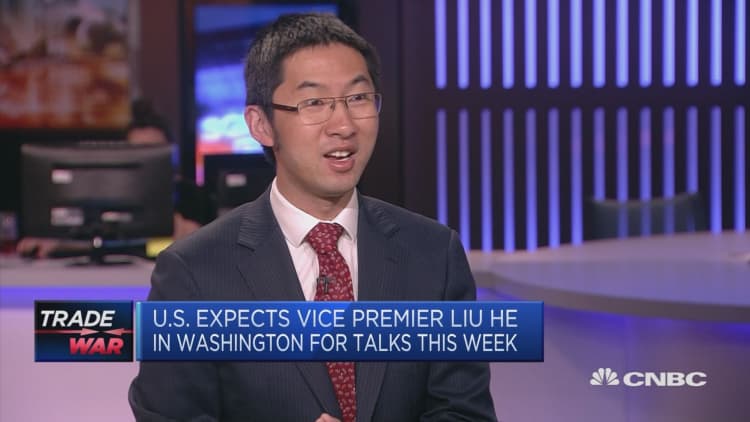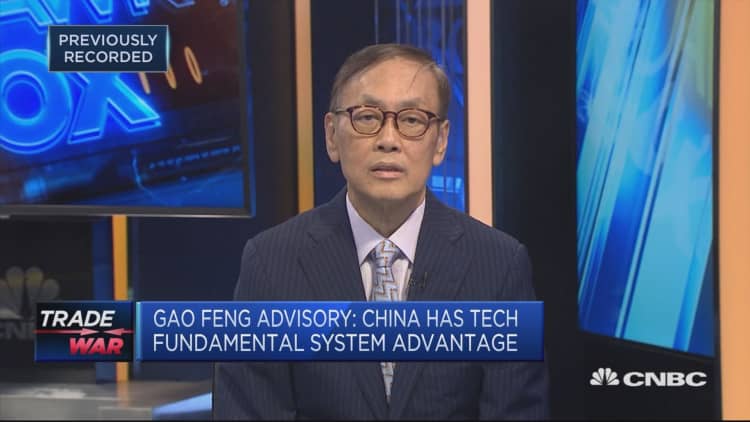The U.S. and China want to be world leaders in technologies like 5G and artificial intelligence — and that could be a key hurdle in resolving trade frictions between the two, experts have told CNBC.
President Donald Trump on Sunday tweeted that the U.S. would raise tariffs on $200 billion in Chinese goods to 25% from the current 10% rate by Friday, and was planning to hit another $325 billion in imports with 25% duties "shortly."
Nevertheless, experts are still hopeful a trade agreement between the two sides will be reached. That's on the back of China confirming that Vice Premier Liu He and other officials will still visit Washington for another round of trade talks, despite reports that Beijing was considering backing out of the scheduled trip.
"A deal of some sort is still likely," William Hobbs, chief investment officer at Barclays Investment Solutions, told CNBC's "Squawk Box Europe" Tuesday. It may be the case that Trump — who once called himself a "Tariff Man" — felt emboldened to put pressure on China given recent positive U.S. economic indicators, Hobbs said.
But the big issue looking ahead, one analyst says, is the two countries' race toward new technologies. The battle to dominate 5G, for instance, has seen Huawei face intense political pressure from the U.S. amid fears its equipment could be used by the Chinese government for spying.

"Tariffs, trade, goods, this is only a sideshow," Geoffrey Yu, head of the U.K. investment office at UBS Wealth Management, said. "The big sign of U.S. contention is going to be on technology, on 5G and those issues. This is going to be a multi-decade process."
'Different era'
Tech could be the crucial issue to solve in finding a complete resolution to Washington and Beijing's dispute.
An end to so-called forced technology transfers, for instance, is a key part of Trump's demands — that is, the claim that U.S. companies are made to hand over their technological know-how in return for access to the Chinese market.
But beyond that, the world's two largest economies are in a fierce race to harness the potential of nascent technologies, including 5G, artificial intelligence and robotics, in a bid to be the world leader in those fields.
"I think we're now in a very different era, where both the Chinese and the Americans — and perhaps other parts of the West — are really trying to take advantage of new forms of technology," Edward Tse, CEO of Gao Feng Advisory, said.
"Everyone is trying to leverage on this new form of technology to come up with new ideas, new business models and new innovations. The race is very different now compared to perhaps a decade ago."
One area China might have an edge in, Tse noted, is in machine learning, because of the vast amounts of personal data companies in the country have access to. One reason for that is that the country has a different approach to major Western nations when it comes to things like data privacy.
Meanwhile, Trump has made it clear that he wants the U.S. to be a leader in 5G. The president has gone as far as to say that he wants 5G, "and even 6G," to arrive in the U.S. "as soon as possible."

And then there's the so-called "splinternet" — the idea that the internet could be fragmented between different countries. China already has its Great Firewall, which blocks access to some foreign websites. But former Google CEO Eric Schmidt has warned there could be a "bifurcation" in the internet, with a China-led platform splitting apart from a U.S.-led one.
While the U.S. and China will still likely produce similar AI products, "in other forms of internet it may not be the same," Tse said. "Perhaps there will be different forms of technology coming up in other forms of the internet."


